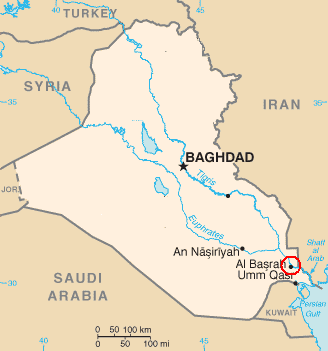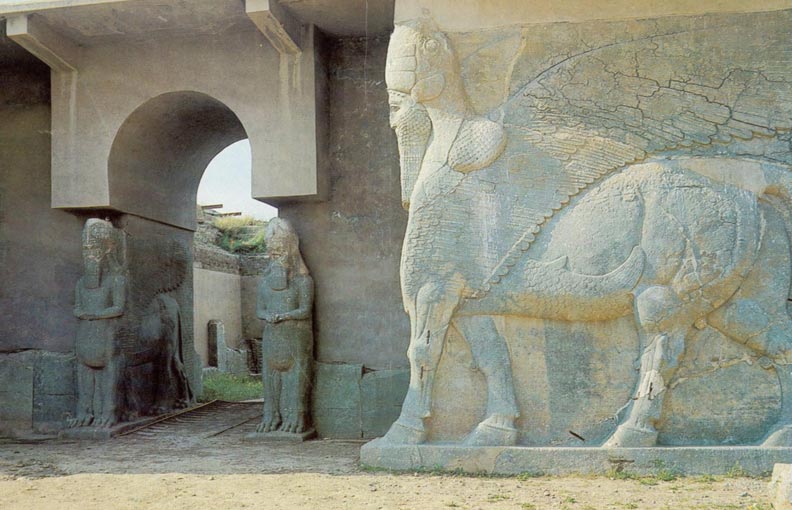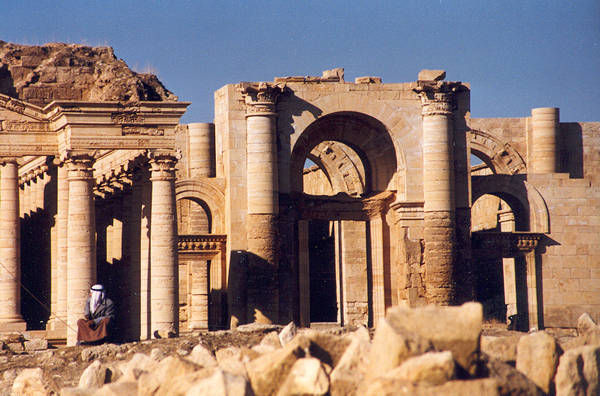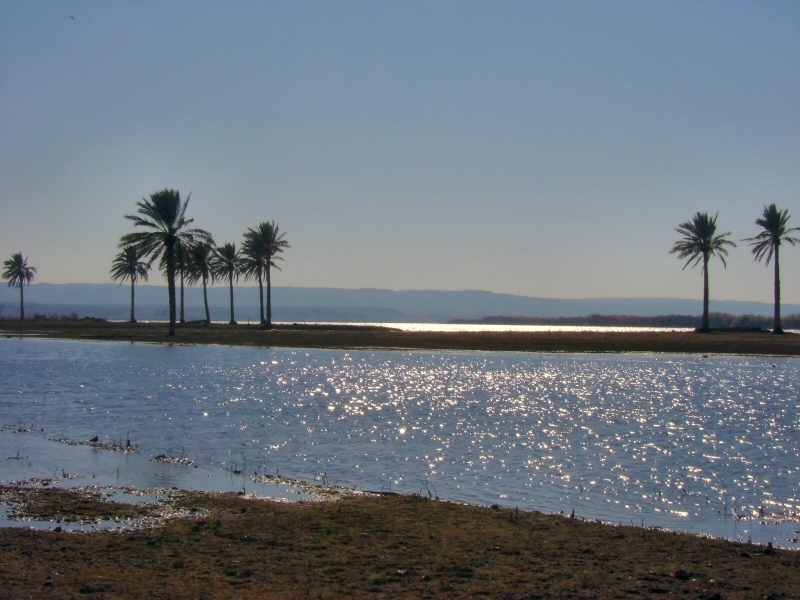Baghdad trip 10 years ago ..
I am attaching an article I wrote for our local
magazine. I am grateful they print it, part of a
series I am writing about my trip there 10 years ago as
part of a Sheffield delegation organised by Peace
activists. I was cynical by nature beforehand but I
could not believe the number of 'catch 22's' possible
in the world. There were many smaller incidents of my
trip I could not put in my article about Basra. We
were shown a Pepsi Bottling Plant (ruins). In the 80's
Saddam nationalised it and it was bombed by the US
during the war shortly after. Iraq was made to pay
compensation to Pepsi after the war.

Iraq; Baghdad to Basra
Before the last leg of our journey south we had a rest
for 2 days in Baghdad. Being more comfortable getting
about on our own I found among the busy shopping areas
a popular snooker hall. As it is one of my favourite
sports I was determined to meet some locals and pot
some balls. The men there were youngish and friendly.
One in particular was happy to find I was from Canada
because he had a sister living in Toronto. Not only
that but he was hoping to visit her soon. I was quite
interested how he would travel as I knew Iraqis would
not be allowed to leave the country. In between games
conversations get broken up by the play and later I
tried to find out more about his impressions of Canada
but at first he became cagey and then suddenly left.
Later in the Hotel I talked about it with my companions
and we considered that the likely way out of Iraq is
overland through northern mountain passes to Turkey.
The engineer I was talking to probably grew too
suspicious of my presence and thought he had said too
much. Not for the first time the Saddam regime
resembled Stalinist Russia more than any other. Later I
had a much better time with the owner of a music shop
called Ali. He wasn't just looking for customers as he
hosted me for hours and was very happy to talk. Quite
unlike another store keeper who repaired wooden
furniture with a lot of kids around and he was quite
drunk. I later met Ali often on in our final days in
Baghdad.

Basra: For centuries this city had been blessed by the
fertility of the two Iraqi rivers emptying into the
Persian Gulf and was the most important seaport of the
Middle East. It was very prosperous and the home port
of Sinbad the sailor and the famous Shatt al Arab
waterway, one of the prettiest bodies of water I have
ever seen. Our Hotel the Sheraton overlooked this spot
but it was surrounded by unkempt buildings and street
children. Outside of the cities live the Marsh Arabs.
Some consider these people are living some of the most
ancient of lifestyles still surviving. They have reed
boats and reed houses to live in; fish, wild birds and
seasonal crops abounding. A wet Garden of Eden. Basra
was going to be the most difficult part of our journey.
I could not imagine there are that many places who have
suffered so long and so hard between decades of
conflict, government suppression and a stifling
climate. Basra has had all of these things. One
particular area of interest for a couple of members of
our delegation was raising awareness of the Depleted
Uranium contamination of the areas all around this
estuary. This is a component in the tips of
armour-piercing warheads that is highly radioactive and
persists in the environment.

What we were to learn from a visit to the Iranian War
Museum was the struggle to rebuild the city after the 8
years of war with Iran from 1980 to 1988. This was a
particularly unique war. US supplied weapons to both
sides and bought oil from both sides and Kissinger
famously said 'It would be good if both sides could
lose" The border with Iran (a predominately Shias
country) is very close and missiles damaged much of the
city and it never had a chance to rebuild before the
onslaught of another kind. Iraqis failed attempt to
annex Kuwait (not 40 miles away) led to another Gulf
War with the US and an International Coalition. This
brought much more destruction including the firing of
hundreds of well heads by the retreating Iraqis. The US
had their own atrocity in the final days of the war
when they strafed thousands of retreating vehicles in a
firestorm of destruction killing untold numbers of
fleeing soldiers, refugees and civilians.

Just after the war the southern Shias resistance to
Baghdad and the Sunni Regime exploded into a popular
uprising. Once again Saddams' rule prevailed and the
brutal suppression damned the region yet again.
On this portion of our trip we had arranged to find the
Roman Catholic Bishop of Basra He had a stalwart,
dispersed flock and he had much dignity and confidence.
He actually had a close brother managing a supermarket
in America. He insisted on inviting our group to his
evening meal prepared by his only companion, a quiet
woman helper. Later that evening we went to one of his
supported housing schemes. Obviously in Basra, poverty
could be the worst out of any part of Iraq. (We saw,
coming in from the outskirts, huge refugee
settlements). While sitting in the humble home of a
large family I noticed after a while my bench had funny
noises coming from underneath the blankets. I looked
under the blankets and saw some chickens. People just
had to make do.

The next day it was the turn of Steve and I to change
some of our groups' English money into Dinars. That
felt pretty adventurous as the Market place had dozens
of money touts and distractions. The Dinar / Dollar
rate changed a few times a day and we couldn't really
trust anyone who was enticing us. We got a few prices
and decided to get another more experienced companion
and try later on. For us it was only about a hundred
pounds but for that we were to get around two brick
sized bundles of Dinars. I took the opportunity to buy
lots of great spices and dried foods and best of all
went to the Post Office to buy a sheet of stamps with
dozens of Saddams' smiling face on them.

Temple ruins at Hattra
We had two important visitations in Basra; one to a
school and another to the Maternity Hospital. Like the
schools in the other parts of the country, it had
almost negligible resources and scant teachers, and a
thousand excited kids who eventually broke out of their
school classrooms as we tried to address a selected
classroom for our modest presentation. In the
schoolyard Heather of our group had planned to gift to
the school a rainbow coloured parachute for parachute
games. It was pretty chaotic but we all felt very
strongly for the children in such a town.
Next we had our appointment at the Maternity Hospital.
From the outset the atmosphere was noticeably strained
and we eventually had a meeting with the head of the
hospital. Our translator, Sodad, had become quite close
to us by this time and sat near his desk. She was a
very intelligent, friendly young lady with many
languages and ambition to match. He looked very nervous
as he told us briefly of the hospital. He then was
telling us of the particular difficult time during an
invasion of foreign troops in the years after the Gulf
War. We thought something got lost in translation but
he was adamant and our translator almost lost her
composure. Of course what we were getting was some
preposterous propaganda but there was no escape! We
were happy to nod politely and get to the heart of our
visit with some of the nurses who were assigned to tell
us of their work with the unimaginable scale of birth
defects they experience. In a side room they opened
some of their files to show us hundreds of photographs
of the fatal deformities they experience there. It was
pretty horrible. So many tragedies years after the
conflict with no one to find definitive causes. The
regime doesn't want to expose countless problems to its
own people and the west refused to acknowledge losses
of life in a conquered country. We left the hospital in
a very somber mood. Never had a maternity hospital had
such a subdued atmosphere.

We had to carry on. Eating gorgeous meals in riverside
restaurants and enjoying a boat- ride up into the
derelict ship-basin. Our plush Hotel would soon be
featured on CNN as a ransacked ruin during the 2003
war. I had a horrible feeling about what history
teaches us.
Next month: Return to Baghdad, Babylon and home.
 Stumble It!
Stumble It!
magazine. I am grateful they print it, part of a
series I am writing about my trip there 10 years ago as
part of a Sheffield delegation organised by Peace
activists. I was cynical by nature beforehand but I
could not believe the number of 'catch 22's' possible
in the world. There were many smaller incidents of my
trip I could not put in my article about Basra. We
were shown a Pepsi Bottling Plant (ruins). In the 80's
Saddam nationalised it and it was bombed by the US
during the war shortly after. Iraq was made to pay
compensation to Pepsi after the war.
Iraq; Baghdad to Basra
Before the last leg of our journey south we had a rest
for 2 days in Baghdad. Being more comfortable getting
about on our own I found among the busy shopping areas
a popular snooker hall. As it is one of my favourite
sports I was determined to meet some locals and pot
some balls. The men there were youngish and friendly.
One in particular was happy to find I was from Canada
because he had a sister living in Toronto. Not only
that but he was hoping to visit her soon. I was quite
interested how he would travel as I knew Iraqis would
not be allowed to leave the country. In between games
conversations get broken up by the play and later I
tried to find out more about his impressions of Canada
but at first he became cagey and then suddenly left.
Later in the Hotel I talked about it with my companions
and we considered that the likely way out of Iraq is
overland through northern mountain passes to Turkey.
The engineer I was talking to probably grew too
suspicious of my presence and thought he had said too
much. Not for the first time the Saddam regime
resembled Stalinist Russia more than any other. Later I
had a much better time with the owner of a music shop
called Ali. He wasn't just looking for customers as he
hosted me for hours and was very happy to talk. Quite
unlike another store keeper who repaired wooden
furniture with a lot of kids around and he was quite
drunk. I later met Ali often on in our final days in
Baghdad.

Basra: For centuries this city had been blessed by the
fertility of the two Iraqi rivers emptying into the
Persian Gulf and was the most important seaport of the
Middle East. It was very prosperous and the home port
of Sinbad the sailor and the famous Shatt al Arab
waterway, one of the prettiest bodies of water I have
ever seen. Our Hotel the Sheraton overlooked this spot
but it was surrounded by unkempt buildings and street
children. Outside of the cities live the Marsh Arabs.
Some consider these people are living some of the most
ancient of lifestyles still surviving. They have reed
boats and reed houses to live in; fish, wild birds and
seasonal crops abounding. A wet Garden of Eden. Basra
was going to be the most difficult part of our journey.
I could not imagine there are that many places who have
suffered so long and so hard between decades of
conflict, government suppression and a stifling
climate. Basra has had all of these things. One
particular area of interest for a couple of members of
our delegation was raising awareness of the Depleted
Uranium contamination of the areas all around this
estuary. This is a component in the tips of
armour-piercing warheads that is highly radioactive and
persists in the environment.

What we were to learn from a visit to the Iranian War
Museum was the struggle to rebuild the city after the 8
years of war with Iran from 1980 to 1988. This was a
particularly unique war. US supplied weapons to both
sides and bought oil from both sides and Kissinger
famously said 'It would be good if both sides could
lose" The border with Iran (a predominately Shias
country) is very close and missiles damaged much of the
city and it never had a chance to rebuild before the
onslaught of another kind. Iraqis failed attempt to
annex Kuwait (not 40 miles away) led to another Gulf
War with the US and an International Coalition. This
brought much more destruction including the firing of
hundreds of well heads by the retreating Iraqis. The US
had their own atrocity in the final days of the war
when they strafed thousands of retreating vehicles in a
firestorm of destruction killing untold numbers of
fleeing soldiers, refugees and civilians.

Just after the war the southern Shias resistance to
Baghdad and the Sunni Regime exploded into a popular
uprising. Once again Saddams' rule prevailed and the
brutal suppression damned the region yet again.
On this portion of our trip we had arranged to find the
Roman Catholic Bishop of Basra He had a stalwart,
dispersed flock and he had much dignity and confidence.
He actually had a close brother managing a supermarket
in America. He insisted on inviting our group to his
evening meal prepared by his only companion, a quiet
woman helper. Later that evening we went to one of his
supported housing schemes. Obviously in Basra, poverty
could be the worst out of any part of Iraq. (We saw,
coming in from the outskirts, huge refugee
settlements). While sitting in the humble home of a
large family I noticed after a while my bench had funny
noises coming from underneath the blankets. I looked
under the blankets and saw some chickens. People just
had to make do.

The next day it was the turn of Steve and I to change
some of our groups' English money into Dinars. That
felt pretty adventurous as the Market place had dozens
of money touts and distractions. The Dinar / Dollar
rate changed a few times a day and we couldn't really
trust anyone who was enticing us. We got a few prices
and decided to get another more experienced companion
and try later on. For us it was only about a hundred
pounds but for that we were to get around two brick
sized bundles of Dinars. I took the opportunity to buy
lots of great spices and dried foods and best of all
went to the Post Office to buy a sheet of stamps with
dozens of Saddams' smiling face on them.

Temple ruins at Hattra
We had two important visitations in Basra; one to a
school and another to the Maternity Hospital. Like the
schools in the other parts of the country, it had
almost negligible resources and scant teachers, and a
thousand excited kids who eventually broke out of their
school classrooms as we tried to address a selected
classroom for our modest presentation. In the
schoolyard Heather of our group had planned to gift to
the school a rainbow coloured parachute for parachute
games. It was pretty chaotic but we all felt very
strongly for the children in such a town.
Next we had our appointment at the Maternity Hospital.
From the outset the atmosphere was noticeably strained
and we eventually had a meeting with the head of the
hospital. Our translator, Sodad, had become quite close
to us by this time and sat near his desk. She was a
very intelligent, friendly young lady with many
languages and ambition to match. He looked very nervous
as he told us briefly of the hospital. He then was
telling us of the particular difficult time during an
invasion of foreign troops in the years after the Gulf
War. We thought something got lost in translation but
he was adamant and our translator almost lost her
composure. Of course what we were getting was some
preposterous propaganda but there was no escape! We
were happy to nod politely and get to the heart of our
visit with some of the nurses who were assigned to tell
us of their work with the unimaginable scale of birth
defects they experience. In a side room they opened
some of their files to show us hundreds of photographs
of the fatal deformities they experience there. It was
pretty horrible. So many tragedies years after the
conflict with no one to find definitive causes. The
regime doesn't want to expose countless problems to its
own people and the west refused to acknowledge losses
of life in a conquered country. We left the hospital in
a very somber mood. Never had a maternity hospital had
such a subdued atmosphere.

We had to carry on. Eating gorgeous meals in riverside
restaurants and enjoying a boat- ride up into the
derelict ship-basin. Our plush Hotel would soon be
featured on CNN as a ransacked ruin during the 2003
war. I had a horrible feeling about what history
teaches us.
Next month: Return to Baghdad, Babylon and home.
 Stumble It!
Stumble It!
0 Comments:
Post a Comment
<< Home